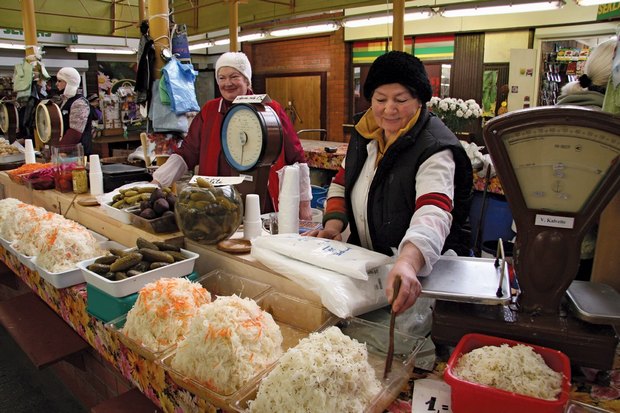
Valija Kalveite (right) with the famous Latvian version of sauerkraut (skäbi käposti) does not need the European Union. Photo: Odd Iglebaek
Some five years ago Latvia joined the European Union: - As a whole that has been good. In particular it has given people the ability to travel and work abroad, is the opinion of Galina Almakova.
Valija Kalveite, a seller of the famous Latvian version of sauerkraut (skäbi käposti) in the neighbouring hall at the huge market, has a different view however: - Take sugar, for example, which we used to produce ourselves in Latvia, excellent quality, but now we have to import it from other member-states. In fact we also get goods from Estonia and Lithuania. No, I do not like this development, we should look to our own producers, she adds.
Compared to that of other delights the sale of skäbi käposti has not been affected by the downturn, notes Valija Kalveite. In that respect she is one of the few not seriously impacted by the economic crisis. For most people the situation has however grown considerably worse since autumn 2008. Unemployment which was 5.6% in October reached 8.3% in January, and the trend continues. By 2010 it may reach 15%.
Aivis Zapereckis is the trucks sales and marketing manager of Domenikss Ltd, who are the agents for Mercedes-Benz in Latvia. He summarizes the country's current economic development thus:
- Over the last three years we saw tremendous growth. Both in the sale of passenger cars and in real estate which really exploded and was to a large extent fuelled by the banks, which were ready to provide easy credit. But now the economy as a whole has come to a crashing stop.
The ongoing crisis has of course also hit the sale of new trucks: - In January this year we sold 28, while in January 2008 we sold 236. It is the same for all others in this line of business, he adds.
Latvia is in many ways a transit country for the European Union's trade with Russia. Many trucks come with the
ferries from Lübeck or Rostock in Germany to Latvia´s harbours. On the ferries the drivers can rest before they continue. Most important however is the fact that they do not have to go through Belarus and spend several extra days at an additional border-crossing.
- Nevertheless, to cross from Latvia to Russia is in itself very time-consuming. Last summer we sometimes had 40 km long queues at the border. That is approximately one thousand trucks, explains Aivis Zapereckis. - However, while the border-crossers had to wait two or three days before Christmas in 2007 in 2008 it took less than a day. Russian stocks were obviously full.
- I really think the European Union must make a political effort to ease border-crossings with Russia. This would be an important step in improving trade including the sales of trucks. No less than 70 percent of all trucks sold in Latvia are primarily used for the long-distance haulage to-and-from Russia, underlines Aivis Zapereckis;
- One of the important benefits of EU membership is the ability it brings to cross borders quickly. This is a positive benefit to business. In line with this, I think that significant effort should be put into creating a motorway from Helsinki to Berlin. That would really be progress, he adds.
During 2006 and 2007 the Latvian housing-market was characterised as a 'sure investment'. Prices increased by 15-20 percent in one year particularly in the most attractive parts of Riga, currently however, hardly any buyers can be found in the housing market.
Of the population as a whole it is the farmers who are perhaps worst hit. Many have borrowed heavily in recent years in order to expand their production – mostly for export. Recent devaluations in Poland and Russia have however made Latvian agricultural goods relatively expensive in their primary markets. The price of milk, which accounts for 60 percent of farm
sales, has been reduced by close to 50 percent, according to the International Herald Tribune. In addition some Latvian farmers' representatives claim they have been undercut by low-cost imports from other EU-members like Germany, which they say provides greater subsidies to their farmers. (IHT 26/02/09)
During January and February 2009 Riga experienced angry demonstrations primarily by industrial workers and farmers. As in Iceland, their demands were that the government should vacate office. By February 20th their wish had been granted.
By Odd Iglebaek